When Alan Hydes’ mum Lily bought him a table tennis bat from Barnsley Co-Operative for ten shillings, little did she know that it would become a metaphorical paddle to steer her son out of a torrent of poverty.
The cheap Slazenger bat paved the way for Alan to travel the world, visiting 52 countries as one of England’s finest table tennis players in the 1960s and ‘70s.
But as Alan says, life for him has been like a lottery, and two little chance attacks towards the end of a rally as a junior would change the course of his life forever.
His was a pimple rubber bat with no sponge, meaning Alan developed a predominantly defensive style of play. The only chance he had of attacking was when his opponent dropped a shot close to the net.
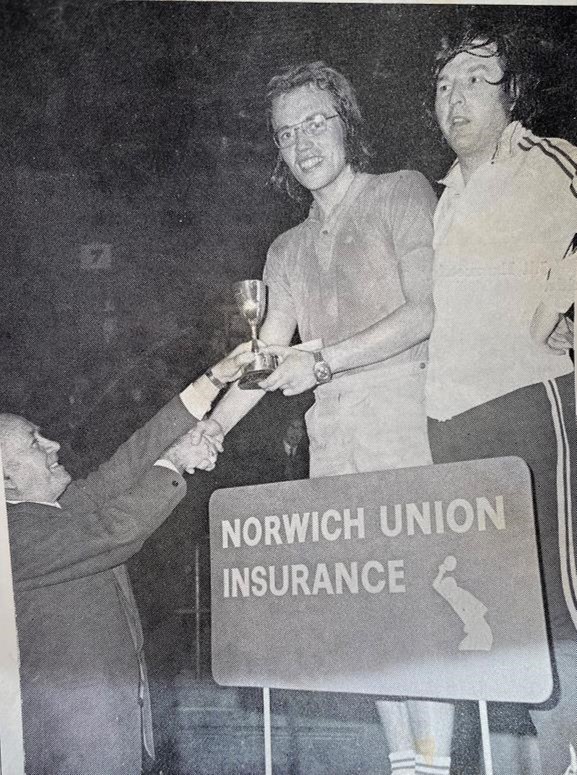
At his first tournament, the 1963 South Yorkshire Open in Sheffield, aged 12, Alan beat the England junior sixth ranked player. Nobody thought this newcomer would have any impact on the competition, but against the odds he proved his mettle thanks to an unexpected drop shot that saw him defeat the tournament’s best player.
This led to him being scouted by table tennis double world champion, Johnny Leach, to attend a summer sports camp at Butlins Skegness in August 1963. He was named boy of the week and won a place at the finals camp in Bognor Regis to compete for the News of the World most promising boy of the year award. Again, thanks to a dropped shot by the net, he was victorious.
The following year he became the youngest person to play for England’s junior table tennis squad, making his debut against West Germany just weeks before his 15th birthday and fighting back from 14-20 to win 22-20.
In 1967 he turned senior, going on to make over 100 international appearances for his country. In 1969 he was ranked sixth in the world and England’s number one table tennis player, having beat the Russian and Hungarian top-ranked players. He even played a part in easing tensions with the Chinese, with a momentous occasion dubbed ‘Ping Pong Diplomacy’.
His sporting career has seen him travel to the likes of Yugoslavia, Trinidad, Czechoslovakia and Tokyo, but Alan says he’ll always be indebted to the people of Barnsley who have helped him along his journey.
From Barnsley Boys Club to Bognor Butlins
Born in 1949, Alan was the second of the four Hydes boys, with older brother Michael, and younger twins Glyn and John. The family lived at New Lodge in Barnsley. With four growing boys to clothe and feed, money was tight. Dad Fred was a miner at Carlton colliery and worked nights for the extra pay, leaving his wife Lily to raise her sons in between working as a school cleaner.
The boys went to Holyrood junior school and then St Michael’s High School where Alan began to show an aptitude for sport. He was the school’s football captain and was picked to play cricket for Barnsley Boys. However, the family’s lack of disposable income put paid to his playing days before they even began.
“I was sat on the coach waiting to leave Barnsley and Mr Rushforth came and asked me if I had my white trousers with me. We couldn’t afford them, so I had white football shorts instead. He said, ‘Sorry son. You’re not playing cricket for Barnsley today.’ I was so embarrassed to be catching the bus home to New Lodge but it gave me the motivation not to be poor all my life,” Alan says.
His older brother Michael persuaded Alan to go with him to Barnsley Boys’ Club. The club, based at what is now the Lamproom Theatre, was run by Pop Pierpoint who was well-known for helping the children of Barnsley.
“We couldn’t afford a hobby like golf or tennis, and for football you needed a team. The subs for the boys’ club were only 4p a week, plus I think Mum was secretly glad that two of us would be out the house after school.”
The boys’ club had one snooker table, one pool table, an indoor five-a-side football pitch, and two table tennis tables, which is where an 11-year-old Alan first tried his hand at the sport.
“One of the tables was chipped, but it gave me something to aim for because if you hit the chip the ball deviated. Table tennis dictated my own fate from then on. I spent four hours a night, from getting there at 6pm to leaving at 10pm, training on that table.”
Alan had a natural gift; he’s ambidextrous, which he says gave him good visual perception of the speed and spin on the ball. He’d also had years of kicking a ball about in his grandma’s yard, pretending to be a superstar footballer every lunchtime while at junior school.
“Pop showed an interest in me, and I gravitated towards his kindness. He could see the promise I had and asked me to join their table tennis team.”
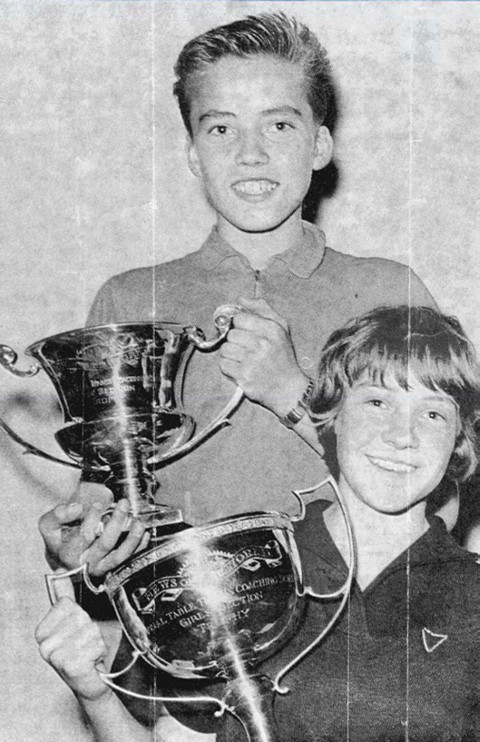
Alan started in division nine and in two years had risen to the first division. Not bad to say he knew nothing about the sport when he joined. He’d even dyed his white shorts blue after finding out they were disallowed. With great visual anticipation, Alan could read where the ball was going and had developed an orthodox technique after reading a book by former tennis star, Ann Haydon-Jones who coincidentally had designed his first bat bought from the Co-Op.
But funds were still a barrier to his future success. For that first tournament in Sheffield, his parents had to borrow the train fare off Alan’s grandad.
“Before he agreed to give me the money, he gave me an interview asking why I wanted to go. I told him I wanted to win, and he said if I wanted to win then he’d back me. But I didn’t have any money for food or drink. It was February and the water pipes were frozen, so I went outside and put snow in my mouth.
“Thankfully some kind people from Barnsley bought me something to eat and gave me a lift back to Barnsley. I didn’t like asking them to take me to New Lodge, so they dropped me in the town and I walked the two-and-half miles home.”
When he won a place at the sports camp in Skegness, his parents couldn’t afford to go with him for the week. But this was an opportunity he couldn’t miss. The talent spotting camps were established by Johnny Leach, who had become a News of the World columnist. Young sporting hopefuls received coaching and assessment from some of England’s top players.
A 13-year-old Alan stayed with a Barnsley family his grandma knew who were coincidentally holidaying there that week. Similarly, when he went to the finals at Bognor Regis the following month, he stayed with the previous year’s winner and her family who were from Doncaster, catching the midnight bus from Doncaster.
But it would prove the right decision. Because his trusty bat limited him to a defensive plan of action, he was marking low against an opponent from London. The two boys were the main contenders for the trophy, so that game would decide the winner. His opponent dropped a shot near the net and Alan was able to smash it back to win the match.
“It was Denis Neal who was marking. Afterwards, he said how it all hinged on that one shot. As soon as I smashed it past him, he knew I’d win. At the awards presentation there were about 2,000 kids stood on the stage and I was right at the back as I thought I’d got no chance of winning. Then they announced the winner was a left-handed table tennis player from Barnsley and I had to push my way through the crowd. The trophy was nearly bigger than me; I could hardly carry it.”
Joining the England team as a Slazenger sponsored player
That Christmas, Alan bought himself a new bat – this time one with a sponge layer and sticky rubber top sheet to create more spin on the ball. This increased the speed and aggression of his serve, helping him become an attacking player, which was difficult when he’d been moulded to be a defender. His technique adjusted overtime to become an all-rounder, with a low swing stood back from the table, the acceleration of which created a varied spin attack.
Alan’s ‘most promising’ win would turn into reality, upsetting the youth table tennis scene with a boy who had come from nowhere. But he’d had a hard slog to get noticed. While his schoolmates were out socialising, Alan would be training or competing around Barnsley, often ending up soaked in sweat. Matches finished at 10.15pm and if he missed the last bus from Barnsley, he’d have to walk all the way to New Lodge. And he was always under pressure to win the prize money to pay for the next tournament.
“It didn’t ever seem like hard work as my body was fit and my mind was young. The alternative would have been a miserable life not achieving anything.”
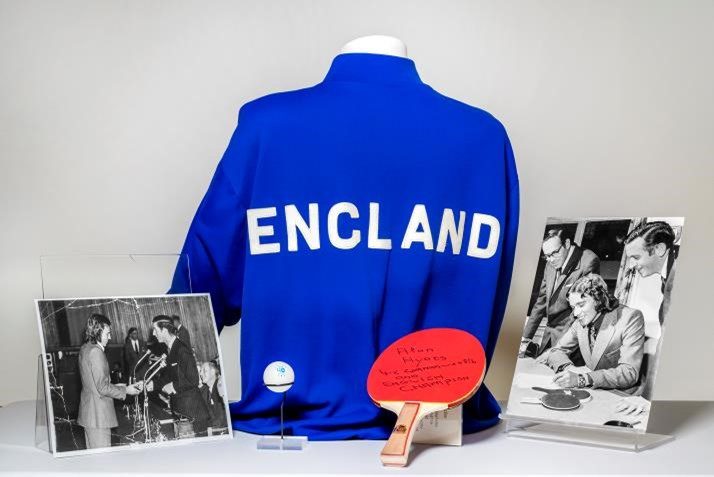
Not long after he joined the England youth team in 1964, Alan was about to finish school.
“I didn’t have the same opportunities as kids these days. My classes were noisy and disruptive so I couldn’t get my head down at school. The only input we had for careers was which coal mine we were going to go down. After I left school, I used to go to Barnsley Library on a Saturday when I wasn’t training and teach myself maths from an old book that would say ‘turn to this page if you got the answer right’.”
Because of his place in the England team, Alan was offered a job in the repairs department at Slazenger’s factory in Horbury near Wakefield. He would catch the bus to the factory at 7am every morning, giving half his £3.50 a week pay packet to his parents. He worked there for four years until he became a full-time sportsman in 1968.
“They were good people and gave me time off to train and play. Slazenger had become my sponsor, so they paid my expenses for tournaments and once I turned senior I earnt royalties from the Alan Hydes bat they produced. After that, I didn’t have much time to work because I was always travelling the world going to various tournaments and competitions. But table tennis was all I could do well, so I always knew it would become my career.”
Life became a rally between English, European and World championships, living out of a suitcase for over ten years. Alan was selected to go to the European Championships in Lyon 1968, Moscow 1970, Rotterdam 1972, and Novi Sadi 1974. The World Championships he went to were Munich 1969, Nagoya 1971, and Sarajevo 1973. He won five English national championships in men’s and mixed doubles, and three gold medals at the inaugural commonwealth championships in Singapore 1971.
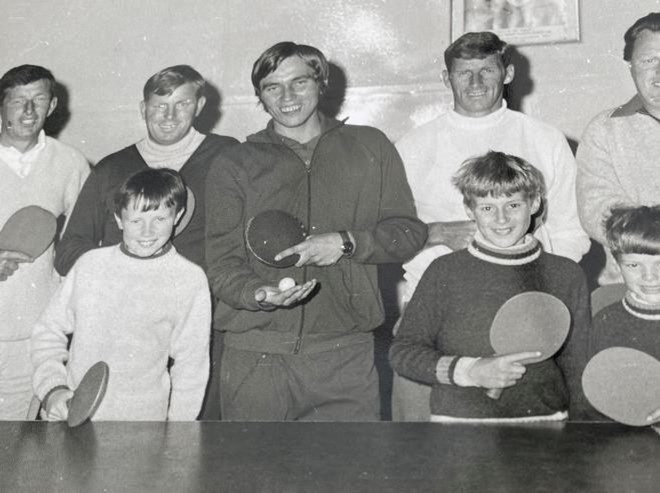
“In sport you either win or lose. It’s easy when you win; you feel exhilarated, elevated. I’d never been happier than when I stood on that podium in Singapore and was given my first gold medal. But it had taken ten years to get there.
“Losing could be terrible, but nobody wanted to listen so I never complained. I just had to learn why I lost and had a notebook where I’d write down the strengths and weaknesses of myself and my opponent. I learnt a lot about my whole character; I had the determination to play to win but never made much of a song or dance about it. My career could have gone either way, so I’m always full of gratitude when I reflect on how fortunate I was.”
Ping Pong Diplomacy thaws tensions of the Cold War
One of Alan’s greatest memories is being part of a world first, where sport was used to establish and improve diplomatic relations. In 1971, table tennis teams from the USA, UK, Canada and Colombia were invited to the Chinese capital – the first time American delegates had set foot in Beijing for over twenty years, and ten years since the England team had played in China.
Dubbed ‘Ping Pong Diplomacy’, it’s the biggest thing that has ever happened in table tennis, thawing tensions that had arisen from the Cold War and Cultural Revolution. Alan was given a once in a lifetime opportunity to train with the Chinese national team as part of a Winston Churchill scholarship.

“We were already competing in Japan but were given our own private plane to go to China. We played in front of audiences that reached 25,000 spectators and every Sunday on my day off I’d go to the Great Wall with a bag of crisps and bottle of pop.
“One day, the England team had to walk across the Lo Wu bridge to Hong Kong, which was classed as no-man’s land in the Vietnam War. The British soldiers who were guarding it chaperoned us so far, then said ‘good luck’ and left us to walk for 15 minutes ‘till we reached the other side to a fanfare of music.
“The chairman of the English Table Tennis Association at that time asked for pandas to be sent to London Zoo. I still speak with the Chinese ambassador now; at Christmas he sent me a bottle of wine and some toy pandas for my two grandsons.”
A career that came full circle with Slazenger
Back on home turf and it was straight back to it. The table tennis season ran September to April, so the summer months were spent at Butlins Bognor Regis sports camps where he returned as a coach for seven seasons between 1968-75.
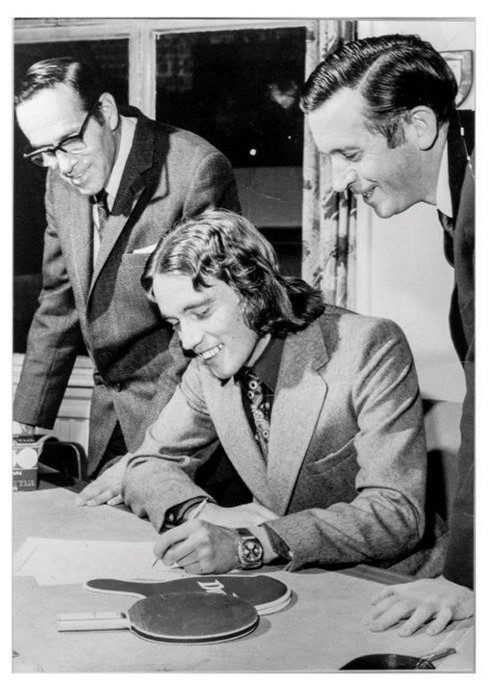
Then he retired from professional sport in January 1975 aged 25 when Roy Evans, chair of the International Table Tennis Federation, offered him the very first coaching role for the New Zealand national team. But after many lonely years of travelling, and feeling cut off from his family in the UK, Alan moved back to Blighty to sign a contract with Dunlop Slazenger as sales and marketing manager at their Croydon office. His family had since moved to West Sussex, so he lived with them and commuted to the capital.
“I knew what made a good bat but I was clueless about the business side of things, so I did a few courses. But my main job was to bring the equipment up to date. Dunlop bats were renowned for being too slow. I knew the sponge suppliers in Asia and managed to source better quality. Sales doubled despite the price going from £8 to £18. The managing director said he wished everyone could do that. But the standard was so bad I could only exceed.”
The same year he met his would-be wife, June, who was from Hoyland and working in the Royal Hotel in Barnsley. After visiting the Barnsley Slazenger factory, Alan called in for a drink before going to collect coal for his grandparents and the pair hit it off. He moved back to Barnsley to be with June and the pair married at Holyrood Church in May 1977. But table tennis still had a part to play in their nuptials.
“Because of what I’d learnt in China, the ITTF asked to host seminars around the world. That year it was in Egypt but I told them I couldn’t as I was getting married the same weekend. They said I could bring my wife with me, and the money was hard to turn down. So we were married in Barnsley on Saturday, and by Sunday we were in Cairo. June still jokes that she spent her honeymoon with 20 men from the Middle East.”
The pair went on to have two children: Teresa who works as a gastroenterologist in Liverpool, and Paul who works in finance at Canary Wharf. Alan and June moved back to West Sussex in the late ‘80s after the two Slazenger factories in Yorkshire closed. All manufacturing went to Hong Kong, so Alan launched his own sports distribution company in 1988, putting his house up as collateral to borrow £30,000 start-up loan.
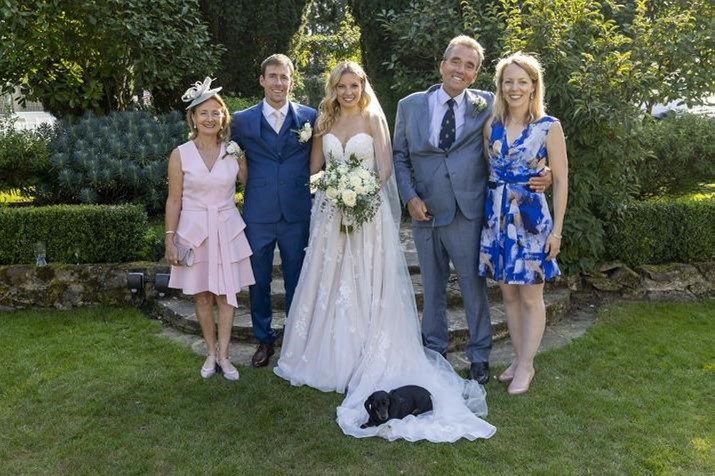
These days, 73-year-old Alan enjoys a slightly slower pace of life, living close to the beach in Sussex and spending more time with his family after a life spent travelling the world by himself. He’s vice president of Table Tennis England so does get invited to table tennis events and has been asked to play at this year’s Veterans Championships in Rimini, Italy.
“They’ve asked me even though I’m rubbish now. I’ve had two knee replacements due to the training I did as a younger man. It was all short, dynamic circuits and bunny hops landing on one knee, which isn’t good for the body and not recommended anymore. I still go to the gym every day, but training is nowhere as intense.”
From Barnsley with love
Table tennis has afforded Alan a life his parents could never have dreamed of. And all because of a 50p bat that served him so well. There’s actually a 50/50 chance that it was another Barnsley sporting star that sold him that very bat. Dickie Bird worked at Barnsley Co-Op at that time and Alan remembers the saleswoman calling on the advice of a colleague who was good at sport to assist.
Dickie and Alan have become good friends over the years and speak regularly. The pair have travelled the world but still everything always resorts back to Barnsley. The last time Alan came back to Barnsley in 2020, he had another blast from the past.
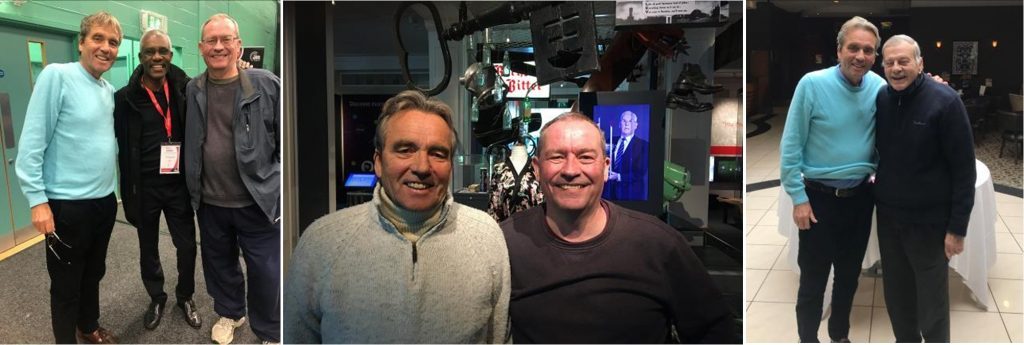
“I was in the gym at the Holiday Inn and couldn’t work the lockers, so I asked this man to show me. He said, ‘It’s Alan, isn’t it? I’ve not seen you since 1962 at Barnsley Boys’ Club and I beat you then. My career went down whereas yours went up.’ I felt like I was on Candid Camera.
“But you just have to do your best through life and be grateful for where it takes you. Before Mum died in 1999, she said to me, ‘We did it all, Alan.’ And I never really understood what she meant until recently. My parents had no money but she put what she could into seeing me succeed.”
Some of Alan’s possessions from his table tennis playing days are included in a new exhibition at Experience Barnsley about the former Slazenger factory. Find out more about Barnsley Serves the World here.






